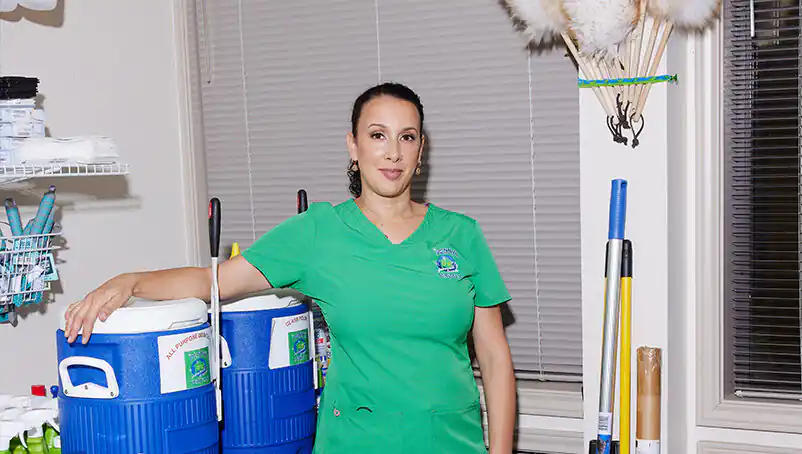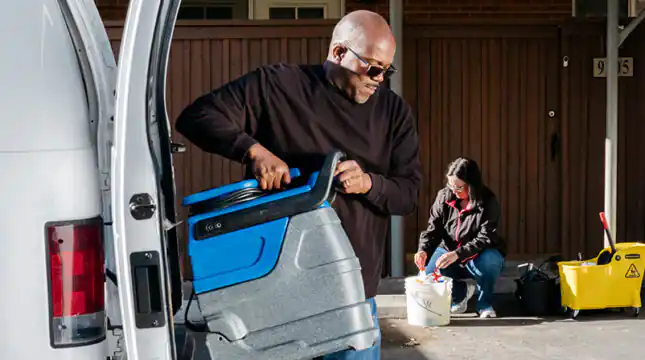How to fund your janitorial business (even on a tight budget)
Starting a janitorial business comes with some upfront and ongoing expenses, but the total cost can vary depending on your location and the types of services you offer. Here are a few costs to consider when starting a janitorial business.
- Startup costs: One-time expenses for offering janitorial services include cleaning equipment, supplies, business registration and license, first insurance payment and marketing materials.
- Operating costs: You can also anticipate recurring expenses, such as restocking supplies and cleaning products, transportation, fuel and ongoing insurance premiums.
So, what’s the earning potential? While startup costs can be relatively low, janitorial businesses also have strong profit potential. According to ZipRecruiter, the average salary for a cleaning business owner in the U.S. is over $127,000 — and some owners earn six or even seven figures by scaling their operations or offering specialized services.
Can I start a janitorial business with no money?
It’s possible to start a janitorial business with little to no money. Starting small can help avoid overspending and test whether people will pay for your services. Once your business becomes profitable, you can reinvest those funds into better equipment or hire staff.
Here are a few ways to start a janitorial business with minimal upfront costs:
- Take on simple cleaning jobs for small offices or local businesses (e.g., spot cleaning, restrooms, break rooms)
- Borrow equipment from your friends, family, or neighbors
- Buy used equipment on Facebook Marketplace or community groups
- Partner with more established janitorial companies and take a percentage of the jobs you bring in.
How to fund your janitorial cleaning company
If you don’t have the cash to start your business right now, don’t worry. Here are ways to bootstrap it on your own:
- Savings: If you’ve set aside extra money, you can use it to get your business off the ground. Just be cautious: dipping into your emergency fund or retirement account can create financial stress.
- Friends or family: Consider asking your personal network for support. To make it more appealing, you could offer them a small share of future profits in return.
- Small business loans or grants: Look into microloans from the Small Business Administration (SBA) to help with startup costs. Local programs or community grants may also exist to support new businesses.
Tip: SCORE and Small Business Development Centers (SBDCs) can help you determine which funding options may be available in your area or for your type of business.
How to start a janitorial business in 7 steps
Starting a janitorial business takes time, effort, and some upfront investment — but it’s absolutely doable with the right plan. Use this step-by-step guide to build your foundation and take the first steps toward running your own cleaning business.
1. Do market research
Market research helps you understand what types of commercial clients need janitorial services in your area — and how to price those services competitively. Most janitorial businesses focus on one or more of the following potential customer types:
- Offices and coworking spaces. May require after-hours cleaning, trash removal, restocking supplies or disinfecting shared spaces.
- Retail stores and showrooms. Often need regular floor care, window cleaning and upkeep of high-traffic areas.
- Healthcare facilities. Require strict sanitation protocols, often with specialized training and products.
- Schools and educational buildings. Typically involves routine cleaning with added attention to restrooms, cafeterias and shared equipment.
- Industrial or warehouse spaces. May need heavy-duty floor care, debris removal and safety-conscious cleaning processes.
The more insights you gather, the better equipped you’ll be to tailor your services. Talk to potential clients about their cleaning challenges, peak hours, expectations, budget and frequency needs.
Tip: Some of the most profitable janitorial niches include floor stripping, post-construction cleanup and green cleaning services — especially in areas where demand is high and competition is low. Focusing on these specialties can help you charge premium rates and stand out in a crowded market.
2. Create a business plan
A small business plan is key to getting your janitorial company off the ground. It doesn’t have to be overly complicated — just putting your goals and service strategy in writing can help you carve out a niche and stay focused as you grow.
If you plan to apply for financing, lenders may require a more detailed version that includes revenue projections and operating costs.
The U.S. Small Business Administration has a helpful guide, including examples of business plans to review.
3. Map out your business budget
A business budget helps you plan for expenses, set income goals, and keep your operations financially healthy. Once you understand how much it’ll cost to launch and run your business, you can set realistic profit goals.
As your business grows, revisit and adjust your budget regularly. If you have extra cash on As your business grows, revisit and adjust your budget regularly. If you have extra cash, you might invest in upgraded equipment or hire additional help. If your expenses start to outpace your income, it may be time to reduce overhead or revisit pricing.
4. Make your business official
Start by applying for an Employer Identification Number (EIN) from the IRS. This is your federal tax ID and is required for tasks like opening a business bank account, hiring employees and filing taxes.
When you apply for your EIN, you’ll also need to choose a business structure. Two common options for janitorial businesses are:
- Sole proprietorship: Easy and inexpensive to set up, but doesn’t offer legal separation between you and your business.
- Limited Liability Company (LLC): Offers personal liability protection and greater flexibility but usually involves more paperwork and filing fees.
Most janitorial businesses need to register with the state, collect and pay applicable taxes and secure the proper cleaning business licenses or permits to operate legally. Some cities may require additional permits — especially if you work with industrial cleaning chemicals or provide services in sensitive environments like schools, hospitals or government buildings.
Check with your city or county to ensure you follow local requirements before taking commercial jobs.
5. Open a business bank account
A business bank account helps separate your personal and business finances. This is essential for clean bookkeeping, accurate tax filing and legal protection — especially if you operate as an LLC.
When comparing business accounts, look at:
- Fees. Prioritize low or no monthly fees, and watch for minimum balance requirements, transaction limits and overdraft charges.
- Features. Look for tools like mobile check deposits, online banking access and accounting software integrations.
- Perks. Some banks offer high-yield interest, welcome bonuses or business credit cards that add extra value.
Your bank will also likely ask for your Employer Identification Number (EIN) or Social Security Number (SSN), business formation papers, business license and ownership agreements (if applicable). So it’s smart to prepare them before you apply.
Quick tip: You may need to know the janitorial cleaning services North American Industry Classification System (NAICS) code to open a business bank account or buy small business insurance. The NAICS code for janitorial services is 561720.
6. Get business insurance
Business insurance can help protect your janitorial company from common cleaning claims — and many commercial clients require it before you start work. Even if coverage isn’t required in your state, it can help you avoid paying out of pocket if something goes wrong.
Here are the key types of insurance to consider.
General Liability insurance
General liability insurance can help protect your janitorial cleaning company if you accidentally damage property or someone (other than an employee) gets hurt. For example, if you damage expensive office equipment while cleaning an office, this coverage may help with repairs and legal costs.
Many commercial clients require proof of general liability coverage before they can work on-site.
Learn more about general liability for cleaning businesses.
Workers’ Compensation insurance
Workers’ comp insurance can help cover medical expenses and lost wages if an employee is injured while working. For example, if a team member slips on a wet floor while cleaning a commercial lobby and needs time off, this coverage may help pay for treatment and recovery.
Most states require workers’ comp if you have employees, but the rules vary — so be sure to check your local requirements.
Learn more about workers’ comp for cleaning businesses.
Errors and Omissions (E&O) insurance
E&O insurance can help protect your business if a client claims your services caused them financial harm due to mistakes, missed tasks or contract issues. It benefits janitorial companies that work under service agreements or provide specialized cleaning services. This coverage may help with legal fees, defense costs or settlements related to professional negligence claims.
Commercial Auto insurance
Commercial auto insurance can help cover accidents involving your business-owned vehicles. It may pay for repairs, medical bills or damage to others if you’re involved in a crash while driving to or from a job. This coverage is important if you use vans, trucks or other vehicles to transport equipment and crews.
Tool and Equipment insurance
Tool and equipment insurance can help cover the gear you use for work — whether it’s stored in your vehicle, in a trailer or on-site. This type of coverage may help if your equipment is stolen or breaks down while in transit or on the job.
7. Buy janitorial equipment and supplies
The janitorial tools and supplies you need will depend on your services and the types of buildings you clean. Here are some common items to consider when starting a janitorial business:
- Wet mop buckets and wringer
- Microfiber cleaning cloths
- Various brushes (toilet, scrub, duster)
- Dry floor cleaning tools (brooms, dustpans, dust mops, sweepers)
- Trash and debris grabber/picker
- Light-duty or heavy-duty scraper
- Squeegee
- Spray bottles, sprayers, and dispensers
- Vacuum cleaner
- Cleaning solutions (multi-purpose, glass, toilet bowl, disinfectants), trash bags, liners, sponges, scrubbers, paper towels
- Protective gear (gloves, non-slip shoes, dust masks/respirators)
- Safety signs
- Basic maintenance tools (plunger, screwdriver, wrench)
- Janitorial cart
As your commercial cleaning business grows, you might invest in higher-grade tools — like a commercial vacuum or floor buffer — to improve efficiency and professionalism.
8. Set up your workspace
Even though your cleaning jobs will take place at client sites, having a home base can help you stay organized and manage admin tasks. Here are a few things to consider:
- Supply storage. Choose a dedicated space, like a garage or shed, to keep cleaning supplies, tools and equipment secure and accessible.
- Office setup. A simple workstation with a laptop, desk, and reliable Wi-Fi can make communicating with clients, sending invoices and scheduling jobs easier.
- Parking. If you use a company vehicle or store gear at home, check local parking or zoning rules to ensure you’re in compliance.
Marketing your janitorial cleaning business
Once your business is set up, the next step is finding new clients. Here are a few low-cost, effective ways to market your janitorial services and build a strong customer base.
Set up a simple website
A professional website helps build credibility and can give you a competitive edge when bidding on commercial cleaning contracts. Make sure it includes your services, location, pricing (if applicable) and contact details.
If you specialize — such as in eco-friendly cleaning, move-in/move-out cleaning or servicing medical offices — highlight that clearly. Adding testimonials and photos of your work (especially before-and-afters of commercial spaces) can help build trust with potential clients.
Look for commercial bidding opportunities
Many larger commercial and government cleaning contracts are posted on public bidding platforms. Registering on these sites can help you find regular, high-value jobs that competitors might miss.
Start by checking procurement sites like BidNet Direct, DemandStar, and your city or county’s official procurement portal. These platforms often list opportunities to submit proposals for janitorial contracts with office parks, schools, healthcare facilities and more.
Pro tip: Set up alerts for keywords like “janitorial,” “commercial cleaning,” or “facility maintenance” in your target region to stay on top of new RFPs.
Claim your business listings and social profiles
Create a Google Business Profile to boost your visibility in local searches. You can also set up Yelp, Angi and Facebook Business pages to help potential clients find you.
For social media, focus on platforms your target customers use. LinkedIn is great for reaching commercial clients. Facebook and Instagram can help you stay active and visible in your local community. Share before-and-after photos of office spaces, breakrooms and other business areas, cleaning tips and testimonials.
Network in your local community
Word-of-mouth and referrals are powerful — especially for janitorial businesses in areas with lots of commercial properties. Contact landlords, property managers and building maintenance coordinators directly to let them know you’re available.
After meeting a potential client, follow up with a short, professional email and a digital brochure or quote outlining your services. You can also try handing out business cards at commercial buildings or posting flyers in local gathering spots like coffee shops and supply stores.
Tap into free small business resources
The Small Business Administration (SBA) offers a ton of free resources to help aspiring entrepreneurs start and grow their businesses. Beyond helpful guides and tools, they also provide funding options and legal resources.
SCORE, a nonprofit backed by the SBA, offers free or low-cost mentorship tailored to your business needs. It’s a great place to get personalized advice, have your questions answered, and access useful templates and workshops.
4 key tips to stay on top of your business finances
Staying on top of your finances is just as important as delivering great service. These simple tips can help you manage your money and keep your janitorial business running smoothly.
1. Track your income and expenses
Spreadsheets are a simple way to start managing your cash flow. Consider switching to accounting software like QuickBooks or Wave as your business grows to manage more complex finances. Keep invoices, receipts and purchase records organized to stay accurate — and ready for tax season.
2. Understand your tax responsibilities
Unlike employees, business owners are responsible for paying self-employment taxes. This may include:
- Quarterly estimated tax payments
- State and local business taxes
- Sales tax, depending on your location
Many small business owners file independently using tax software like TurboTax or H&R Block. If things get complicated, it’s smart to consult a local accountant who understands your industry.
3. Separate personal and business finances
Using a business bank account makes it easier to track spending and prepare for taxes. It also helps protect your personal assets — especially if your business is structured as an LLC. A business credit card can also help with cash flow and build credit.
4. Consider hiring a pro
Software can handle a lot, but a local accountant may be worth the investment if managing your finances starts to feel overwhelming. A tax pro can help you maximize deductions, avoid costly mistakes and save time.






